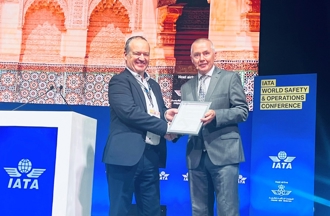
Marrakech - The International Air Transport Association (IATA) announced that 100 airline CEOs have committed to the IATA Safety Leadership Charter since its launch at the 2023 edition of the IATA World Safety and Operations Conference. The announcement that Lynne Embleton, CEO of Aer Lingus joined the Charter was made during this year’s event in Marrakech from 1-3 October.
“Flying is safe because aviation’s safety culture begins at the very top level of management. The Aer Lingus CEO and other 99 CEOs who have signed the IATA Safety Leadership Charter account for some 70% of global traffic. In their commitment is a call for the rest of the industry’s CEOs to join them in this fundamental charter. And by the next IATA World Safety and Operations Conference, I look forward to being much closer to universal coverage,” said Willie Walsh, IATA’s Director General.
“At Aer Lingus we put safety first, there is nothing more important. Across every area of our airline, we are deeply committed to, and focused on, maintaining the highest safety standards. Leadership plays a critical role in shaping and sustaining a strong safety culture, ensuring that every decision we make is grounded in the wellbeing of our passengers, crew, and operations. Signing this charter further reinforces Aer Lingus’ unwavering dedication to safety and strengthens our commitment to lead by example in promoting a safety-first mindset across the industry,” said Lynne Embleton, CEO Aer Lingus.
The IATA Safety Leadership Charter, developed in consultation with IATA members and industry stakeholders, outlines eight key leadership principles that CEOs pledge to uphold. These principles include:
- Leading by example: Reinforcing safety through both words and actions.
- Raising awareness: Fostering safety awareness at all levels, from the boardroom to frontline staff.
- Integrating safety into business: Embedding safety into the strategic, operational, and performance metrics of the organization.
- Building capacity: Developing the internal capacity to proactively manage safety and achieve organizational safety objectives.
- Fostering trust: Creating an environment where employees feel responsible for safety and are empowered to report safety issues without fear.
- Establishing clear expectations: Defining and communicating acceptable and unacceptable safety-related behaviors.
- Promoting shared responsibility: Encouraging all employees to take ownership of safety within their roles.
- Continuous improvement: Regularly assessing and enhancing the organization’s safety culture.
IATA supports continuous safety improvement with a three-pillar strategy consisting of: Safety Leadership (including both safety leadership and culture), Safety Risk (identifying and mitigating risks through data collection and analysis from audits, accident reports, and other sources) and Safety Connect (providing the links so that safety leaders report, discuss, and resolve safety issues).
For more information, please contact:
Corporate Communications
Tel: +41 22 770 2967
Email: corpcomms@iata.org
Notes for Editors:
- IATA (International Air Transport Association) represents some 350 airlines comprising over 80% of global air traffic.
- You can follow us on X for announcements, policy positions, and other useful industry information.
- Fly Net Zero

